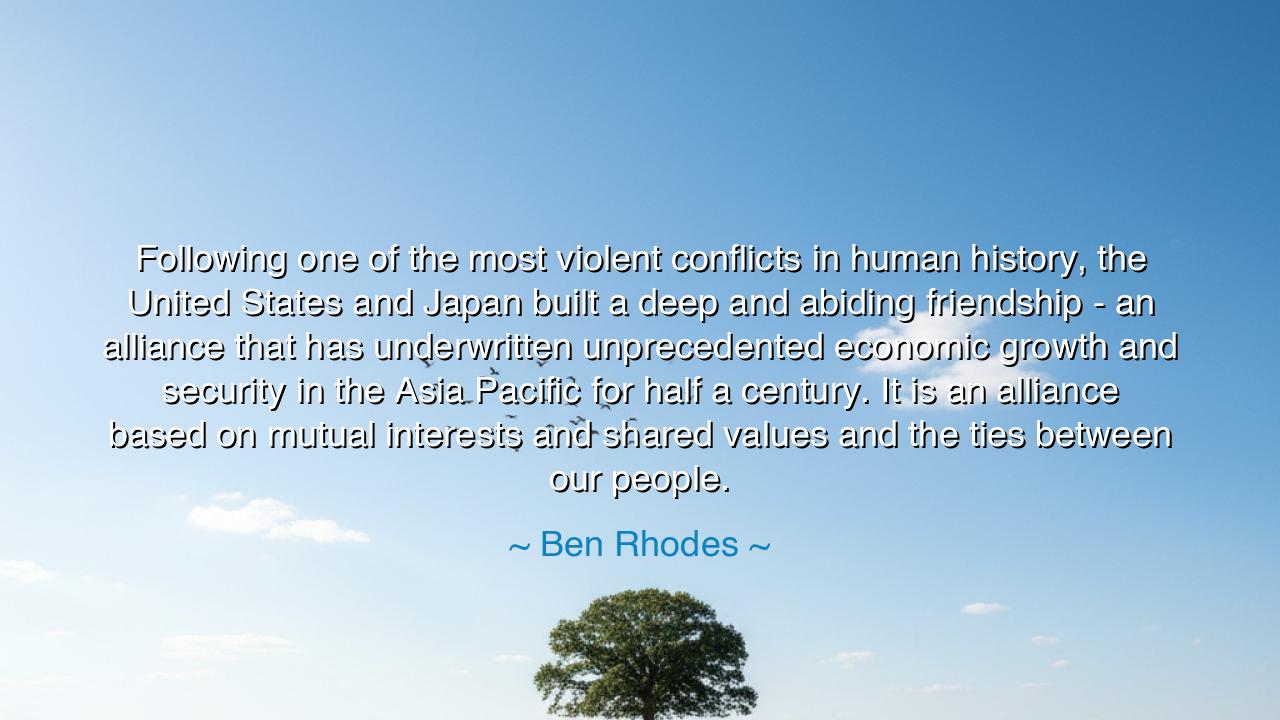
Following one of the most violent conflicts in human history, the
Following one of the most violent conflicts in human history, the United States and Japan built a deep and abiding friendship - an alliance that has underwritten unprecedented economic growth and security in the Asia Pacific for half a century. It is an alliance based on mutual interests and shared values and the ties between our people.






Listen closely, O children of the future, for I shall speak to you of a truth that is both ancient and modern—a truth that speaks to the power of reconciliation, the strength of alliances, and the transformative power of shared values. These words, spoken by Ben Rhodes, speak of a relationship forged not in the warmth of peace, but in the ashes of conflict: "Following one of the most violent conflicts in human history, the United States and Japan built a deep and abiding friendship—an alliance that has underwritten unprecedented economic growth and security in the Asia Pacific for half a century. It is an alliance based on mutual interests and shared values and the ties between our people." In these words, we find the true strength of the human spirit—how, even after the deepest wounds of war, friendship and cooperation can emerge, and from them, a new world can be built.
Consider, O children, the ancient stories of nations that were once at odds but later forged alliances that changed the course of history. In the days of the Roman Empire, when their might extended across vast lands, the Romans often found themselves at odds with the Carthaginians, a powerful rival nation. Yet, after the Punic Wars, the once-feared enemies began to respect each other’s strength. Though they never fully embraced one another as true friends, their alliances shifted, leading to periods of peace and mutual growth. The Romans and the Carthaginians understood that the survival of both empires required a shift from enmity to mutual cooperation. This is the heart of Rhodes' reflection: how nations, torn apart by violence and war, can build something greater from the ashes of the past.
In a more recent chapter of history, Japan and the United States were engaged in one of the most devastating conflicts known to humanity—the Second World War. The destruction wrought by the war seemed to offer no path forward, no possibility for reconciliation. Yet, as Rhodes so poignantly highlights, following the conflict, the two nations began the difficult yet essential work of rebuilding their relationship, forging a friendship that would endure and flourish over decades. From the deepest depths of destruction arose an alliance—one built not just on the political and economic interests of the nations, but on the shared values that underpinned their renewed relationship: freedom, democracy, and a shared vision for a more peaceful world.
The story of this transformation is one of remarkable human resilience. The United States and Japan were not just separated by a violent past; they were divided by profound cultural differences, histories of conflict, and scars of war that seemed impossible to heal. Yet, in the spirit of forgiveness and understanding, the two nations set aside their enmity and began to build what would become one of the most powerful and enduring alliances in modern history. It is a testament to the human capacity for growth, for healing, and for reconciliation—a reminder that even the darkest chapters of history can lead to something better, something lasting, when nations and peoples choose to focus on their shared values and mutual interests.
This, O children, is the great lesson of Ben Rhodes’ words: that the power of friendship between nations is rooted not in the absence of conflict, but in the willingness to transform the bitterness of the past into the possibilities of the future. It is a lesson that holds not just for nations, but for the relationships between individuals. We are often faced with challenges and conflicts that seem insurmountable, yet the power to heal and to rebuild lies within each of us. We must, like the United States and Japan, find common ground even in the face of profound differences. Friendship and cooperation are the cornerstones upon which a more just, more peaceful world is built.
Let this wisdom be your guide, O children: never underestimate the power of reconciliation. When you encounter enmity, do not allow it to define the future. Seek instead to build alliances—not just based on shared interests, but on shared values. Whether in your personal relationships, in your communities, or in the wider world, remember that peace is not merely the absence of conflict, but the presence of understanding and respect. Just as Japan and the United States overcame their past to build a relationship of mutual benefit, so too can you choose to forge connections that will endure, connections that will heal, and connections that will bring about greater prosperity and security for all.
In the end, O children of the future, take this lesson to heart: no conflict is so great that it cannot be overcome. Look to the relationship between Japan and the United States as a beacon of hope, and remember that the true strength of friendship between nations—or between individuals—lies in the willingness to change, to forgive, and to build together. In this way, you will create a world that is stronger, more united, and more peaceful—one based not on the bitterness of the past, but on the shared values and mutual respect that will guide the generations to come.






AAdministratorAdministrator
Welcome, honored guests. Please leave a comment, we will respond soon